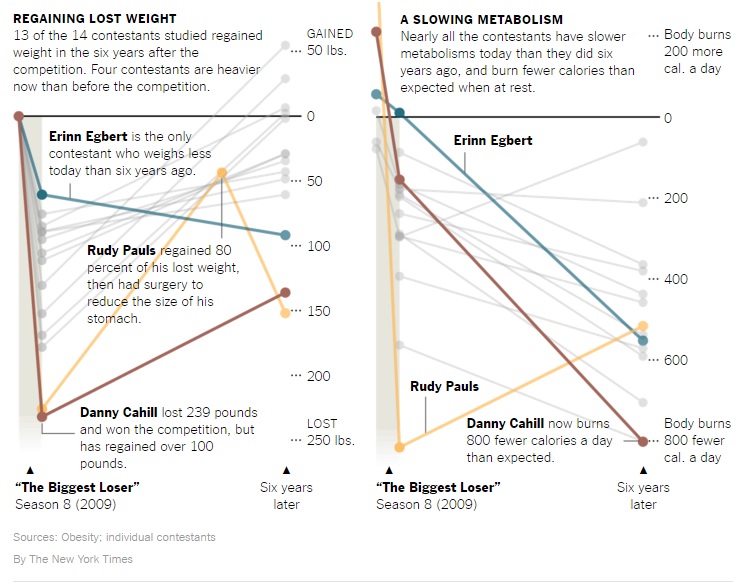New Study of 'Biggest Loser' Players Has a Rude Awakening About Weight Loss
By:
A new study of the weight loss in contestants from CBS' "Biggest Loser" explains why it's harder to keep weight off than it was to lose it in the first place.
 NBC/The Biggest Loser - nbc.com
NBC/The Biggest Loser - nbc.com
The study followed participants from season eight of the hit reality TV show for up to six years after they left the show. Researchers measured what happened to them after they'd lost large amounts of weight through intensive diet and exercise. The results, which were recently published in the journal Obesity, were staggering: They found that the human body will fight back for years against weight loss, actively working against our ability to sustain long-term weight goals.
Why it may be so hard to keep the weight off
More than one in three American adults struggles with obesity, and for many of these individuals, it may feel like their body is fighting against them as they try to shed the pounds and keep them off. According to Kevin Hall, an expert on metabolism at the National Institute of Health's National Institute of Diabetes and Digestive and Kidney Diseases, this unfortunately isn't far from the truth.
Reviewing weight and metabolic data from 14 of season eight's 16 contestants, Hall's team found that their resting metabolism slowed dramatically after their weight loss, making it much harder to maintain their goal weights. (Resting metabolism is what determines how many calories an individual burns when not active and is vital to helping us maintain a healthy weight.)
Participants in the study had normal resting metabolisms for their size prior to joining the "Biggest Loser." But by their final weigh-in on the show, the number of calories that their bodies burned had radically declined.
Scientists already knew that when a person diets to lose weight, his metabolism will be slower when the diet ends than it was at the beginning. What they didn't expect to find was that a person's resting metabolism may not recover, even years later.
Your body is working against you.
"The key point is that you can be on TV, you can lose enormous amounts of weight, you can go on for six years, but you can't get away from a basic biological reality," said Michael Schwartz, an obesity and diabetes researcher at the University of Washington, after reviewing the study. "As long as you are below your initial weight, your body is going to try to get you back."
According to Hall's team, as time went by and participants regained weight, the contestants' metabolisms still didn't recover. In fact, for many, they became even slower, causing them to put on weight far more easily than they should, effectively pulling them back toward obesity.
 New York Times - nytimes.com
New York Times - nytimes.com
This is what happened to Danny Cahill.
Take contestant Danny Cahill. He lost 239 pounds on the show, winning the competition. At the time Cahill finished the show, his metabolism had slowed to burning around 200 calories fewer a day than someone of his size should burn. As the years went on after the show, his metabolism didn't improve, despite his gaining about 100 pounds back. He now burns 800 fewer calories a day than he should, meaning that he has to eat far less than a typical man of his size to maintain his weight loss.
This may explain why 13 of the 14 contestants studied regained weight in subsequent years. Four of the contestants actually became heavier than they were before the competition. Only one of season eight's contestants managed to keep the weight from returning: She weighs slightly less than she did when she left the show. (She has to eat about 552 fewer calories than the average woman of her size to maintain her weight loss.)
"This is a subset of the most successful [dieters]," commented Dr. David Ludwig of the New Balance Foundation Obesity Prevention Center about the study, of which he did not take part. "If they don’t show a return to normal in metabolism, what hope is there for the rest of us?"
That doesn't mean that all hope is lost, however: It simply means that weight issues are more complex than previously thought and that blaming yourself or others for an inability to keep weight off is likely misguided.
The findings "shouldn't be interpreted to mean we are doomed to battle our biology or remain fat," Ludwig said. "It means we need to explore other approaches."
